Key Differences Between Gas and Propane Grills
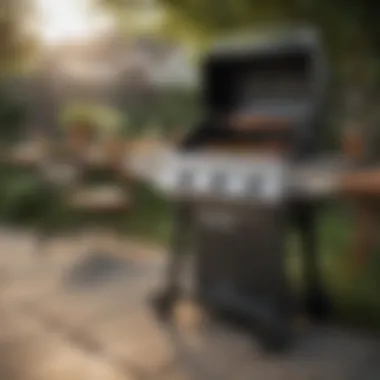
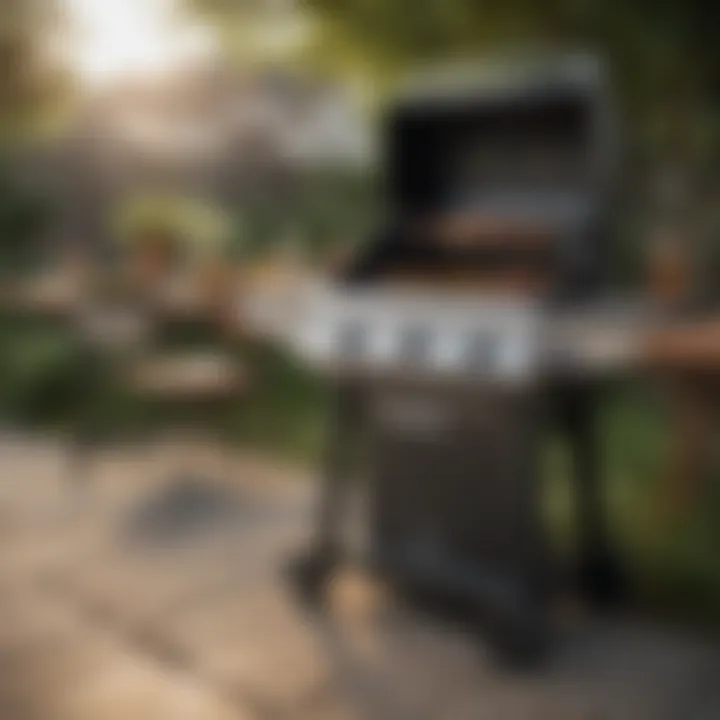
Intro
When it comes to outdoor cooking, choosing the right grill can make or break your experience. Both gas and propane grills are popular options for grill enthusiasts and homeowners alike. Each comes with its own set of characteristics that influence performance, flavor, and convenience. Understanding the distinctions between gas and propane grills is crucial for anyone looking to enhance their backyard cooking. This guide will explore their differences in detail, helping you decide which grill best suits your needs.
Gas grills typically use natural gas directly from residential lines. This connection can provide a constant supply of fuel without the need to replace tanks. On the other hand, propane grills operate on propane gas stored in portable tanks. Each type of grill offers unique benefits, risks, and maintenance requirements.
In this article, we will examine various factors that contribute to the efficacy of both types of grills, including fuel types, temperature control, convenience, and maintenance practices. This comprehensive overview aims to equip homeowners and grilling enthusiasts with practical insights, ensuring a satisfying grilling experience.
Prelims to Grilling
Grilling is more than just a method of cooking; it is a tradition that spans cultures and generations. For many people, grilling is a way to connect with family and friends while preparing delicious meals outdoors. Understanding the various aspects of grilling is crucial for both newcomers and seasoned enthusiasts. This article covers not just the how-tos but also the essential differences between gas and propane grills.
Choosing the right grill can significantly affect the outcome of your culinary efforts. The discussions surrounding fuel type, convenience, and control affect not only cooking times but also the flavor of the food. Homeowners who wish to elevate their outdoor cooking experience or entertain guests need to be aware of these differences.
Historical Context of Grilling
Grilling has deep roots in human civilization. The earliest forms of grilling date back to our ancestors, who used open flames to cook meat. This method was essential for survival, as it improved food safety by killing pathogens present in raw meat. As societies evolved, so did grilling techniques.
In ancient Rome and Greece, people began to explore the art of grilling. They enjoyed using different woods and herbs to enhance flavor. During the Middle Ages, grilling continued to develop, influencing various cultures. Today, grilling is a beloved pastime not only in the United States but around the world. From summer barbecues to holiday gatherings, the tradition persists.
Types of Grills in Use Today
In modern times, the grilling landscape has diversified. There are several types of grills, each offering unique features and cooking experiences. Here are a few common types:
- Charcoal Grills: Known for their ability to impart a smoky flavor to food, charcoal grills are often favored by traditionalists. They require more time to heat up and necessitate careful temperature control.
- Gas Grills: Popular for their convenience and quick start-up time, gas grills can be fueled by propane or natural gas. They provide more consistent heating but may lack the distinctive flavor produced by charcoal.
- Electric Grills: Ideal for those in apartments or places where open flames are not allowed, electric grills are easy to use and maintain. However, they can lack the grilling experience found in other types.
- Pellet Grills: Using compressed wood pellets, these grills combine the ease of gas with the flavor of charcoal. They offer a unique method for smoking and grilling, appealing to a wide range of grilling enthusiasts.
Deciding on the right grill depends on personal preferences and lifestyle. This sets the stage for understanding the key differences between gas and propane grills, which this article will delve into in more depth.
Basics of Gas Grills
Understanding the basics of gas grills provides essential insight for anyone interested in outdoor cooking. Gas grills have become widely popular for their convenience and efficiency. They are easy to operate compared to other grilling methods. Knowing the features and fuel options available enriches your grilling experience and helps you tailor your setup to suit your cooking style and needs.
Overview of Gas Grilling
Gas grilling involves using gas as a fuel source to heat grill burners. This method is known for providing quick heat and consistent temperature control. Immediate ignition allows for instant grilling, making it appealing for busy individuals or those hosting gatherings.
The heat distribution in gas grills is generally uniform, enhancing cooking efficiency. Many models come equipped with various features, such as side burners and rotisserie kits. These enhance flexibility during food preparation. However, the cooking flavor might not compare with charcoal grilling for some enthusiasts.
Common Fuel Sources for Gas Grills
Grilling with gas typically involves three main fuel sources: natural gas, butane, and propane. Each option has distinct characteristics that affect performance and usability.
Natural Gas
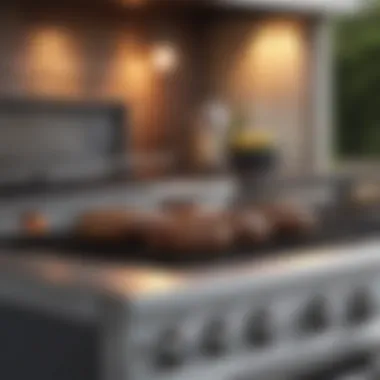
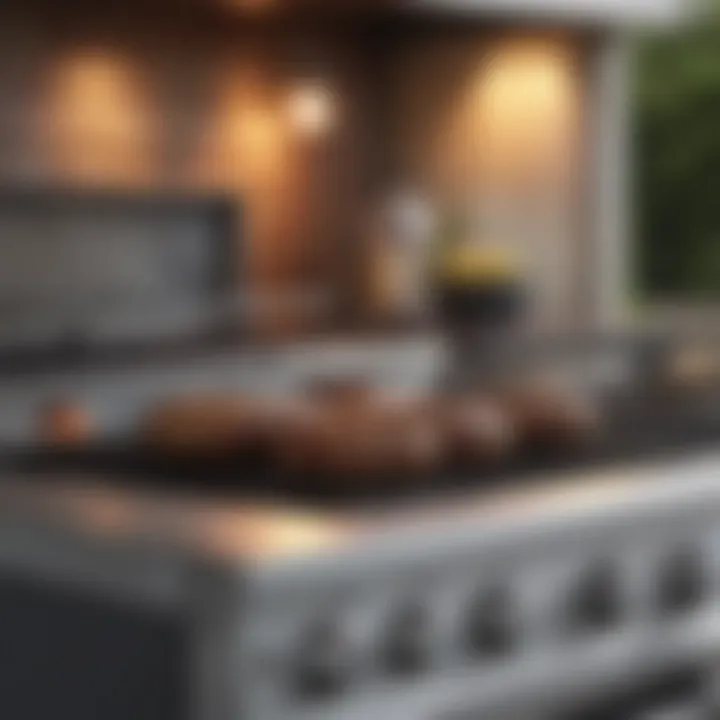
Natural gas is a common choice among homeowners due to its cost-effectiveness and availability in many urban areas. The main advantage of natural gas is its convenience; once connected, there's no need to refill tanks. This means ongoing usage is straightforward and reliable, particularly for frequent grillers. However, natural gas grills require a dedicated line installation, which might be unfeasible for some users.
Butane
Butane offers portability, making it suitable for camping and outdoor events. It is often found in smaller canisters, which makes it easy to transport. However, butane can be less efficient than propane, especially in colder temperatures. Grillers should consider their cooking environment when selecting butane gas. It remains a good option for those needing frequent mobility.
Propane
Propane is a popular choice for its high efficiency and strong heat output. It can also be stored in portable tanks, making it flexible for use at home or on the go. The heat from propane burns hotter than natural gas. This feature appeals to many grilling enthusiasts. However, it is essential to monitor tank levels, as running out mid-cooking can certainly impede your plans.
Exploring Propane Grills
Propane grills represent a unique subset of outdoor cooking tools, distinguished not merely by their fuel but by the entire experience they offer. A significant factor that makes propane grills worth exploring is their widespread popularity among both novice and seasoned grillers. Understanding the nuances of propane as a fuel source is essential for anyone considering adding a grill to their outdoor setup.
Understanding Propane as Fuel
Propane is a hydrocarbon gas that is stored under pressure and typically used in liquid form. It is a byproduct of both natural gas processing and crude oil refining. One of the compelling advantages of propane is its portability; if you have a propane tank, you can easily transport your grill to various locations, including tailgating events or family gatherings.
The energy content of propane is also noteworthy. It produces more heat per unit than natural gas, making it efficient for cooking. This means you can achieve high cooking temperatures relatively quickly. Propane burns cleaner than some other fuels, leading to a lower production of soot and carbon buildup inside the grill. This characteristic can make maintenance easier in the long run.
Benefits of Using Propane Grills
When considering the adoption of a propane grill, several benefits stand out:
- Ease of Use: Propane grills ignite quickly and allow for easy temperature adjustment, giving users more control over their cooking process.
- Portability: As mentioned, propane tanks can be easily transported. This allows outdoor cooking at various locations without a specially installed gas line.
- High Heat Output: Propane produces higher temperatures, making it suitable for searing meats or achieving charred flavors. This characteristic is often sought by grill enthusiasts who aim for specific cooking results.
- Clean Fuel: Utilizing propane leads to less soot and residue, which can improve cookware longevity and reduce the need for deep cleaning.
- Availability: Propane is widely available in tanks at many local gas stations, hardware stores, and large retailers.
"Portability and heat output are two of the distinguishing benefits of propane grills that make them a favorite among grilling enthusiasts."
Propane grills can be an excellent addition to your grilling toolkit. They encourage versatility, making them ideal whether you're hosting a backyard barbecue or preparing a meal for your family.
Key Differences Between Gas and Propane Grills
Understanding the key differences between gas and propane grills is essential for both beginners and seasoned grill enthusiasts. Each type of grill offers unique advantages, influencing selection based on individual preferences and needs. Identifying these differences can aid users in making informed decisions, thus enhancing their grilling experience and ensuring that their chosen grill meets their specific cooking requirements.
Fuel Composition
The fuel compositions of gas and propane differ fundamentally. Natural gas primarily consists of methane, while propane is derived from natural gas processing and crude oil refining. This difference affects their energy content. Propane generally provides a higher energy output than natural gas per unit volume. Thus, cooks can expect quicker heating times and better performance with propane grills, especially when cooking large cuts of meat or requiring high heat.
Furthermore, propane is often stored in portable canisters, making it easier for users to refuel when necessary. Natural gas, conversely, is usually connected to a gas line, rendering it less mobile. This can influence setup depending on the grilling scenario. Ultimately, understanding the chemical compositions and their implications can guide users in selecting the right fuel source for their grilling preferences.
Efficiency in Cooking
Both gas and propane grills exhibit varied efficiencies, influenced by their fuel types and designs. Propane grills often heat up faster due to their higher energy concentration, which can be crucial for quick cooking sessions. Additionally, propane burns more efficiently than natural gas, producing more heat in less time. This can lead to shorter cooking durations, which is particularly advantageous when preparing meals for a gathering.
In contrast, natural gas grills provide a steady fuel supply at a constant rate, resulting in a consistent cooking environment. While the heating time may be longer than that of propane, the cost-effectiveness of natural gas can lead to lower long-term operational expenses. It presents a practical option for frequent grillers, balancing heating efficiency and fuel costs effectively.

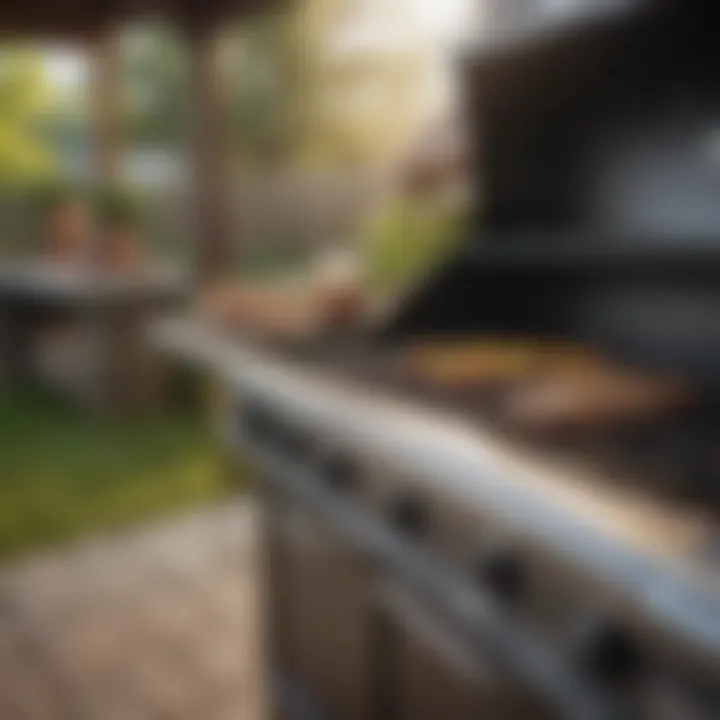
Temperature Control and Cooking Results
Temperature control is critical for successful grilling. Both gas and propane grills allow users to manage heat levels effectively, but their performances can differ in practice. Propane grills typically offer a more responsive temperature control. Users can adjust the flame from low to high with a quick turn of knobs, providing immediate changes in cooking temperatures. This responsiveness can greatly influence cooking outcomes, especially when dealing with delicate foods requiring precise heat management.
On the other hand, natural gas grills may exhibit slight delays in temperature adjustments. They, however, often maintain a more consistent temperature over extended periods, which is advantageous for slow cooking or smoking sessions. Grilling enthusiasts aiming for specific cooking results should consider how these differences in temperature control align with their grilling techniques.
Ease of Use and Convenience
When evaluating the ease of use and convenience between gas and propane grills, several factors emerge. Propane grills often come pre-assembled and are portable—ideal for users who grill in various locations, such as parks or tailgating events. The portability of propane canisters adds to this convenience. Users simply swap out a near-empty tank for a full one when needed.
Conversely, natural gas grills require a more permanent setup connected to a gas line. This setup can lead to limitations regarding mobility but enhances convenience in terms of not needing to refuel constantly. Users can start grilling at any time, provided their gas supply is stable. Weighing the trade-offs between portability and convenience can help users decide which grill aligns with their lifestyle preferences.
Maintenance Considerations
Maintenance plays a crucial role in keeping gas and propane grills functioning effectively and safely. Regular upkeep can prolong the lifespan of the grill and enhance performance. Neglecting maintenance can lead to safety hazards and poor cooking results, which can spoil your outdoor cooking experience. It is essential for grill owners to understand proper maintenance practices to ensure they can enjoy their grilling for many seasons to come.
Cleaning Procedures for Gas and Propane Grills
Cleaning is one of the fundamental aspects of grill maintenance. Both gas and propane grills require specific cleaning methods, yet the same general principles apply.
- Remove Grate and Burners: Start by disconnecting the propane tank or turning off the gas supply. Then, remove the grate and burners to facilitate better access for cleaning.
- Clean Grates: Use a grill brush or sponge with soapy water to scrub the grate. Avoid using harsh chemicals. Rinsing and drying the grate before reattachment is crucial to prevent rust.
- Burner Maintenance: Inspect the burners for clogs caused by grease or food particles. Use a pipe cleaner or a small brush to clear any obstructions.
- Interior Cleaning: Wipe down the inside of the grill with soapy water. Inspect for any signs of rust or damage and take necessary actions to repair,
- Exterior Care: The outer surface of the grill should be wiped down regularly. While stainless steel grills look good, they can show fingerprints and stains. Use appropriate cleaning products to maintain their appearance.
This cleaning routine should be performed at least once per season but may need to be done more frequently based on usage. Keeping the grill clean not only enhances flavor but also prevents the buildup of harmful bacteria.
Safety Checks and Precautions
Ensuring safety is paramount when maintaining gas and propane grills. A few simple checks can prevent potential hazards and ensure a safe grilling experience. Here are essential safety checks to perform regularly:
- Leak Detection: At every tank change, check for gas leaks. You can do this by preparing a soap solution and applying it to the hose and connections. If bubbles form, there is a leak that requires immediate attention.
- Regulator Inspection: The regulator controls the pressure of the gas. It should be checked for wear, cracks, or damage. Replace it if necessary.
- Hose Condition: Inspect the gas hose for any signs of wear or abrasion. If the hose is damaged, it must be replaced to ensure safety.
- Flare-up Precaution: Always monitor your grill when in use. If flare-ups occur, close the lid to deprive the flames of oxygen.
Regular safety checks are vital. They not only protect you but also enhance your grilling experience by ensuring your grill operates as it should.
Utilizing these maintenance considerations is an indispensable part of grilling. By committing to cleaning and safety checks routinely, grill owners will ensure not only their safety but also optimized cooking results.
Cost and Accessibility
In any discussion about grilling, the concepts of cost and accessibility are critical. Not only do they shape the initial purchase decision, but they also influence long-term satisfaction and usability. Understanding these factors can ultimately guide homeowners and enthusiasts in selecting the grill that meets their needs without straining their budget or complicating their cooking processes. Cost includes not just the initial investment but also ongoing fuel expenses and maintenance needs. Accessibility pertains to how readily available these grills are and the availability of their respective fuel sources.
Initial Investment and Setup
When considering gas versus propane grills, the initial investment can vary significantly. Gas grills, which typically connect to a natural gas line, might require a higher setup cost. This includes installation fees and possibly a conversion to gas supply if the home is not already equipped. In addition, some models demand specific equipment to function properly, which can add to the overall monetary commitment.
On the other hand, propane grills often have a lower upfront cost, making them appealing to beginners. However, it's crucial to consider the long-term implications of purchasing a propane grill. While the grill itself may be economical, one must factor in the recurring purchase of propane tanks. Each 20-pound tank can cost anywhere from $15 to $30 depending on location and supplier, and users should prepare for the frequency of refills if they plan to grill often.
When assessing initial costs, it is also wise to consider the technology involved in grill design and how that impacts prices. Higher-end grills, whether gas or propane, come equipped with additional features, such as advanced temperature controls and better materials, which enhance usability but also escalate costs.
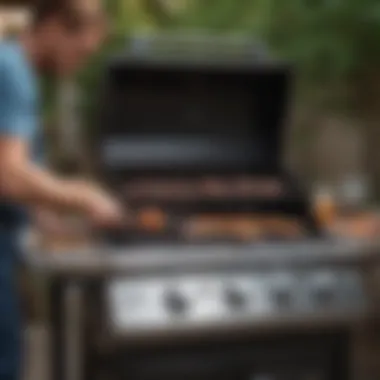
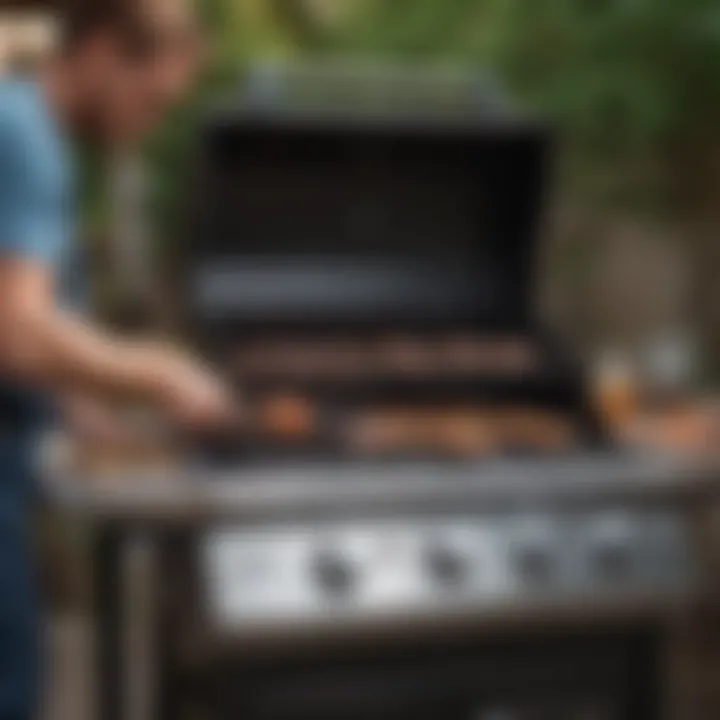
Fuel Availability and Price Comparison
Another dimension of the cost discussion is the availability and price of fuel. In areas with natural gas infrastructure, homeowners might find connecting a gas grill to be straightforward and less costly in terms of ongoing fuel expenses. Natural gas is often cheaper per BTU compared to propane, making it a compelling choice for frequent grillers. The cost can vary by region, influenced by supply and demand dynamics and local energy policies.
Conversely, propane can be convenient if one doesn’t reside in a region supported by a natural gas infrastructure. However, prices for propane can fluctate. As a result, budget-conscious consumers must closely monitor how much they are investing in fuel. One key benefit of propane is portability; it allows for use in areas without direct gas lines, making it suitable for camping or tailgating.
"While initial costs can set the stage, understanding ongoing expenses related to fuel significantly shapes the overall value of a grill."
Optimal Use Cases
Understanding the concept of optimal use cases is essential when choosing between gas and propane grills. Each type of grill comes with unique advantages that cater to different cooking styles, preferences, and situations. Evaluating these optimal use cases helps the reader find a grill that aligns with their individual grilling needs and their lifestyle. Additionally, this section delves into the scenarios that maximize the benefits of both gas and propane grills, thus facilitating a more satisfying outdoor cooking experience.
Best Scenarios for Gas Grilling
Gas grilling shines in various situations for several reasons. One notable advantage is the quick startup time. With just the turn of a knob and a spark, the grill is ready for cooking. This is particularly beneficial for busy homeowners or party hosts who may need to prepare meals in a limited timeframe.
Moreover, gas grills typically require less maintenance than their propane counterparts. The simplicity of their design and the nature of natural gas contribute to a decrease in the accumulation of residues and the effort needed for regular cleaning. Therefore, families that grill frequently will find gas grilling appealing.
Furthermore, gas grilling allows for precise temperature control. Many gas grills have advanced burners that enable accurate heat adjustments. This feature is significant for individuals who cook a variety of foods, from searing steaks to grilling delicate vegetables.
Unordered list highlighting best scenarios for gas grilling:
- Time-sensitive occasions like weeknight dinners.
- Frequent outdoor gatherings and parties.
- Diverse cooking needs requiring precise temperature control.
- Ease of maintenance appreciated by busy cooks.
Ideal Situations for Propane Grilling
Propane grilling presents its own set of ideal use cases. One of the most compelling advantages is its portability. Propane tanks can be easily transported, making these grills suitable for outdoor events like tailgating, camping, or beach barbecues. This adaptability allows users to experience grilling in locations that may not have a natural gas hook-up.
Additionally, propane grills can provide higher heat output compared to gas grills in many instances. For those who enjoy quick searing or cooking at high temperatures, propane can deliver the necessary intensity. This factor can significantly influence cooking times and flavors, particularly when grilling meats.
Another consideration is the availability of propane. In some areas, propane refills are more accessible than natural gas connections. This can make a propane grill a more convenient option for those who may not have natural gas service at their residences.
Ordered list emphasizing ideal situations for propane grilling:
- Outdoor events like camping or tailgating where portability is key.
- High-heat cooking situations that demand intense heat.
- Locations without natural gas access.
- Flexibility in outdoor cooking environments.
In essence, choosing between gas and propane grilling often comes down to the specific needs and scenarios that align best with the user’s lifestyle and cooking habits, emphasizing the value of understanding optimal use cases.
Closure
In the realm of outdoor cooking, choosing between gas and propane grills is not a trivial matter. This article's examination of both options underscores vital elements that should guide your decision-making process. Understanding the differences allows homeowners and grilling enthusiasts to tailor their choice according to their specific needs and grilling styles.
Why Consider Final Thoughts on Grilling Choices
As we've discussed, the fundamental characteristics of gas and propane grills extend well beyond mere fuel types. Factors such as efficiency, ease of use, maintenance requirements, and cost implications play critical roles in determining which grill best suits individual lifestyles.
"Grilling isn't just about cooking; it encompasses choice, convenience, and craftsmanship."
- Flexibility in Use: Propane grills may appeal more to those who need a portable solution, while gas grills serve well in fixed setups.
- Cooking Efficiency: Understanding the nuances of temperature control can elevate your grilling game. Each type of grill offers varying degrees of precision.
- Maintenance and Safety: Being aware of safety protocols and maintenance procedures can significantly influence your grilling experience. Routine checks and cleanliness are paramount for efficiency and longevity.
- Cost and Accessibility: Your budget and local fuel availability will further guide your choice. Propane may be cheaper or more accessible in some areas as compared with natural gas, affecting long-term operational costs.
Ultimately, your decision should reflect your preferences in cooking techniques and lifestyle demands. By considering the factors laid out in this article, you can make an informed choice that enhances your grilling adventures. Selecting the right grill isn't just about functionality; it’s about maximizing enjoyment and achieving the best results in outdoor cooking.



